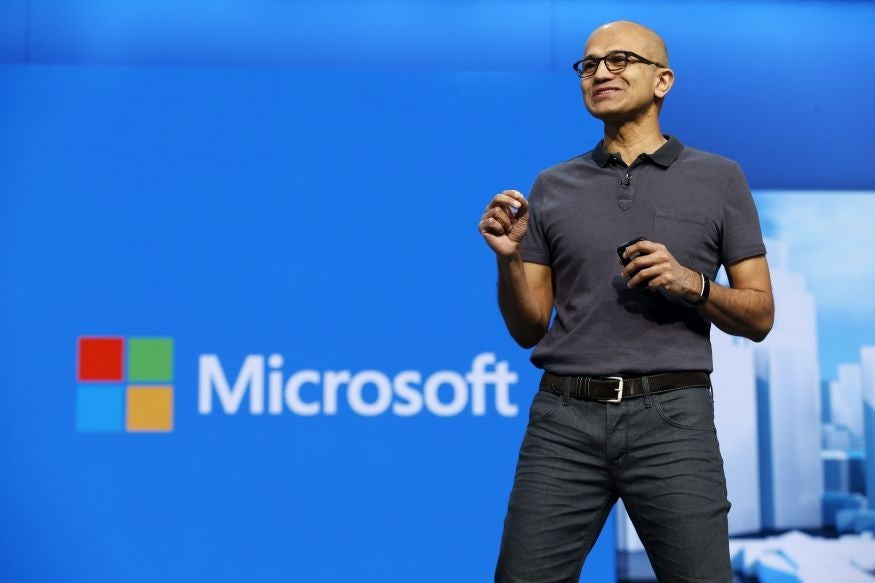Why Microsoft should ice its work for America's toxic ICE
Employees are unhappy about the contract with US Immigration and Customs Enforcement, which has become despised globally as a result of it separating children from their parents at the southern border

Your support helps us to tell the story
From reproductive rights to climate change to Big Tech, The Independent is on the ground when the story is developing. Whether it's investigating the financials of Elon Musk's pro-Trump PAC or producing our latest documentary, 'The A Word', which shines a light on the American women fighting for reproductive rights, we know how important it is to parse out the facts from the messaging.
At such a critical moment in US history, we need reporters on the ground. Your donation allows us to keep sending journalists to speak to both sides of the story.
The Independent is trusted by Americans across the entire political spectrum. And unlike many other quality news outlets, we choose not to lock Americans out of our reporting and analysis with paywalls. We believe quality journalism should be available to everyone, paid for by those who can afford it.
Your support makes all the difference.Google got into hot water with employees over working for the US Defence Department – it ended up calling time on the project.
Now it’s Microsoft’s turn to receive criticism over what it does as part of a contract with Immigration and Customs Enforcement (ICE).
More than 100 employees posted an open letter to the company’s internal message board on Tuesday, protesting about the work and asking for it to be stopped.
Staff complaints come in the wake of the outrage sparked by the Trump administration’s zero tolerance policy that ICE is central to.
The policy refers all immigrants caught crossing the border without authorisation for criminal prosecution. One of the results is that more than 2,000 children have been separated from their parents.
“We believe that Microsoft must take an ethical stand, and put children and families above profits,” said the letter, which was addressed to the company’s chief executive, Satya Nadella.
His initial response, via a company wide email, was interestingly rather similar to that of Google’s initial reply to the furore over its involvement with the Defence Department’s Project Maven: take a chill pill, guys. We don’t help with any of the bad stuff and we never would!
Mr Nadella said the contract only covers things like email, calendars and messaging.
Really, that’s a bit like saying we help out with the email servers for Lex Luthor’s plumbing business. Lexcorp Loos might not have anything to do with securing world domination for the CEO, and killing Superman in the process, but it’s still part of an organisation for which that is the aim.
But then the plot thickened. A blog by Tom Keane, head of global infrastructure at Microsoft Azure Government, emerged in which he talked about enabling ICE employees to utilise “deep learning capabilities to accelerate facial recognition and identification”. He added that the business was “proud to support this work with our mission-critical cloud”.
You do wonder if one of those error messages we’re all familiar with popped up in the PR department when that one came out.
Of course, the blog post has now gone viral, and it has only added to the unhappiness about the work at Microsoft.
CEOs hate being pushed around by their staff. The problem is that in Silicon Valley attracting super brains to your business and keeping them happy is arguably more important than either the identity, or the ego, of the CEO.
If I were a recruiter for Google, Apple or Facebook, talking to an idealistic and top-rated Stanford graduate hailing from outside the US, I might be inclined to say, ‘of course we wouldn’t have anything to do with that sort of work for ICE’, if I knew Microsoft was the competition.
Were I from Google, I’d be saying, ‘look, when our people spoke about what we did for the Defence Department we listened. That’s the sort of company we are. Now come work for us. Have you seen our massage chairs? And we have a free canteen and roller hockey games too!’
Perhaps as important as this is the fact that Microsoft is a global business. Doing the sort of work discussed in the blog post, and expressing pride in it, for one of the world’s most toxic organisations could have toxic implications for its brand.
So if Microsoft is smart it’ll ice its work for ICE as soon as is practicably possible, even if that means upsetting Donald Trump and his pals.
Most importantly, it would be the right thing to do. But it would also be sensible and pragmatic from a business standpoint.
Join our commenting forum
Join thought-provoking conversations, follow other Independent readers and see their replies
Comments